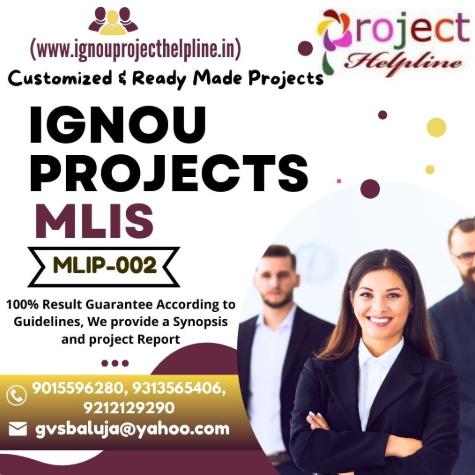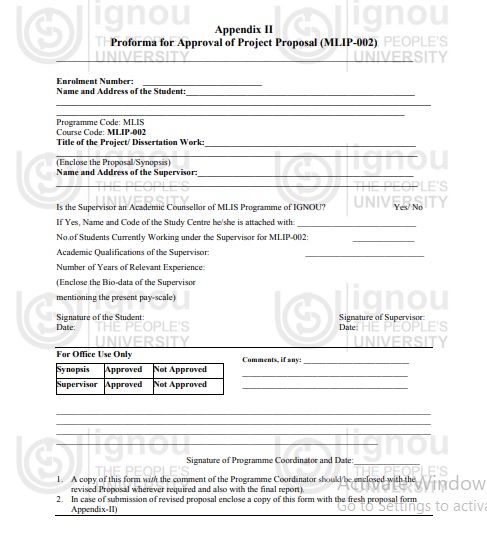IGNOU MLIS (MLIP‑002) Project Synopsis
MLIS (MLIP‑002) Project Topic List
MLI-101: Information, Communication and Society
- Post-industrial Society.
- CODATA Task Group (on Accessibilityand Dissemination of Data).
- Free Flow of Information (Barriers to Information).
- Information Communication Chain.
- Information Generation Process.
- Shannon Weaver Model.
- Holistic and Spectrum Approaches to Knowledge.
- Growth Patterns of Disciplines.
- Role of Information Scientists in Knowledge Utilisation.
- Components ofNational Information Policy.
- Information Economics.
- Information Society.
- National Information Infrastructure.
- DigitalInformation.
- Digitisation of Information.
- Knowledge Professionals.
- Knowledge Society.
- Knowledge Management.
MLI-102: Management of Library and Information Centres
- Management Framework for Libraries.
- Role of Management Information System(MIS) in Planning and Controlling.
- Leadership Styles.
- Libraryand Information Systems.
- Time and Motion Studies.
- Operation Research in Libraries.
- Management by Objectives (MBO).
- Human Resource Management in Libraries.
- Human Resource Planning for Libraries and Information Centres.
- Total QualityManagement (TQM).
- Methods of FinancialEstimation in Libraries.
- Performance Management for Libraries and Information Centres.
- Change Management Concepts.
- Organisation Behaviour in Libraries and Information Centre.
- Implication of e-marketing.
- BudgetaryControlfor not-for-profit Organisations.
- Cost EffectivenessAnalysisvs. Cost Benefit Analysis.
- Information as a Marketable Commodity.
- Market Segmentation.
Elective Courses
MLIE-101: Preservation and Conservation of Library Materials
- Inherent Characteristics of Library Materials andtheir Preservation.
- History of Writing Materials in India.
- Preservation and Conservation of Palm Leaf Manuscripts.
- Preservation and Conservation of Birch Bark Manuscripts.
- Preservation and Conservation of Non-book Materials.
- Preservation of Optical Media.
- Environmental Factors as Detractors to Library Materials.
- Control Measures for Protection of Library Materials from Biological Pests.
- Preventive Conservation.
- Binding for Different
- Type of LibraryMaterials.
- Binding Materials.
- Stages of Binding Process.
- International Standardsfor Binding.
- Indian Standardsfor Binding.
- Book Pests.
- Disaster Management for Libraries.
- Restoration Procedures for
- Library Materials.
- Organisation for Knowledge Preservation.
MLIE-102: Research Methodology
- The Quest for Solutions to Practicaland Theoretical Problems Result in Research Activity.
- Research in Libraryand Information Science leads to the Designand Better Management Skills on the Part ofan Information Professional.
- Library Science Research and Development of Operational Skills.
- Basic Research vs. Applied Research: Objectives and Methods.
- Research Techniques are Means Rather than Ends in Themselves.
- Identification of a Research Problem.
- Survey Analysis and Content Analysis as Methods of Research.
- Presentation of Results of Research.
- Time Series and its Components — Contribution to Research Techniques.
- Steps involved in the Analysis of Data for the Preparation of a Research Report.
- Drafting of Research Report.
- Statistical Methods in LIS.
- Designing a Questionnaire (Realexample)
- Preparing a Proposal (Realexample)
- Preparing a Research Report (Real example)
MLIE-103: Academic Library System
- Academic Libraries ProvideAccess to Scholarship.
- Academic Libraries formthe Keystone in theArch of Higher Education.
- Role ofAcademics in Promoting Library Use.
- Should we Go for Fee or Free Based Library Services in anAcademic Library System?
- Library Governance.
- Library Collections are Described as ―Instructors of Instructors‖.
- The Success of an Academic Library Depends Much on its Personnel.
- Teleconferencing as a Continuing DeliverySystem.
- Resource SharingAvoids Duplication of Money, Manpower and Material.
- Library Networks Facilitate Sharing and Optimum Use of National and International Information Resources.
- Resources and Services of INFLIBNET.
- Role of UGC in Modernising the LibraryServices.
- UGC Service Conditions and Pay Scales Enhance the Status of the Professionals.
- Information Based Learning and Teaching.
- E-consortiaApproach to Academic Libraries.
MLIE-104: Technical Writing
- Reader-writer Relationship.
- Aberrations in Technical Writing.
- Tools for TechnicalWriting.
- Preparation of Technical Reports.
MLIE-105: Informetrics and Scientometrics
- The Journey from Bibliometrics to Informetrics is Characterised byDevelopment in Methods and Techniques Rather Than Objectives and Purposes.
- Mathematical Models and their Application in Scientometrics and Informetrics.
- Bibliometrics and Informetrics Laws and their Implications in Library and Information Science.
- The Development of Science Citation Index is a Landmark for Scientometrics and Informetrics Studies.
- Measuring Scientific Productivity- Problems and Prospects.
- Growth and Obsolescence Study of Literature – A Means for Library and Information Centre Management.
- Science and Technology Indicators – A Tool for Policyand Decision Makers.
- Understanding Science in Developing Countries – A Methodological Approach Through Scientometrics and Informetrics.
- Approaches to Modeling in Scientometrics and Informetrics.
MLIE-106: Public Library System and Services
- Public Libraries Serve as an Instrument of Social Change.
- Development of Public Libraries Needs an Appropriate Policy at State and National Level.
- Physical, Financial and Human Resources Constitute an Effective Public Library System.
- Planning Helps to Systematically Move Towards Achievement of Goals.
- The Success of Management of Public Library System Depends Much on its Governance.
- Performance Evaluation is an Important Tool to Measure the Strength and Weakness of Public Library System.
- Accessibility Plays an Important Role in Providing Library S ervices.
- Resource Sharing and Networking among Public Libraries Improve Quality of Library and Information Services.
MLIS (MLIP‑002) Project Synopsis Structure
1. Title of the Project
Provide a concise and precise title reflecting the nature and scope of your study.
2. Introduction / Background
Introduce the context and significance of your chosen topic. Explore why the study matters.
3. Rationale of the Study
Explain the need for conducting this study, its relevance, and benefits.
4. Statement of the Problem
Detail the specific issue or gap your study aims to address.
5. Objectives and Scope of the Study
Clearly list 2–3 objectives your project will accomplish. Also define the scope or boundaries of your research.
6. Research Methodology
Outline your methodological approach. This may include:
Type: Survey, case study, interviews, mixed-methods, etc.
Sources: Primary (questionnaires, interviews) and/or secondary (literature, databases).
Sample size.
Tools and analysis techniques.
Ensure relevance of chosen methodology to your objectives.
7. Expected Contribution (Outcomes)
Highlight the intended result or impact, summarised in 2–3 sentences.
8. Limitations
Briefly acknowledge potential constraints (e.g., sample size, time, data access).
9. Chapterisation (Outline)
Propose a chapter-by-chapter structure for the eventual report:
E.g., Introduction, Literature Review, Objectives & Scope, Methodology, Data Analysis, Findings, Conclusion, Limitations, Bibliography, Appendices.
10. References / Preliminary Bibliography
List key literature you intend to draw upon.
11. Questionnaire / Data Collection Tool (optional)
Provide a draft if you’re using a survey or questionnaire instrument.
Why This Structure Works ?
- This structure aligns with projecthelpline.in’s recommended format, ensuring completeness and clarity.
- It also merges best practices from broader IGNOU guidelines: emphasis on clear objectives, methodology, ethical considerations, and formatting

What You Can Do Next
Select a Topic: For inspiration, here are some established MLIP‑002 project themes from the blog:
Study of the problems and constraints in initiating library automation
Design of web‑based information services for the visually challenged persons.
Impact of ICT on library and information services.
Draft Each Section: Start with your title and introduction, then expand to objectives, methodology, and the other segments outlined above.
Consult Your Supervisor: Submit your synopsis draft for approval and feedback, which is mandatory before proceeding.
Finalize & Submit: Use A4, double spacing, correct formatting, and include:
The approval letter from your supervisor
Guide’s bio-data
Project Proposal Proforma (if applicable)
Youtube Video For MLIS MLIP002
Approval letter For MLIS MLIP002

Need Help with Your MLIS MLIP002 Project?
Contact us today for professional guidance and ready support to ensure your synopsis and project report gets approved without hassles.
For more details contact us at 9015596280, 9212129290, 9313565406